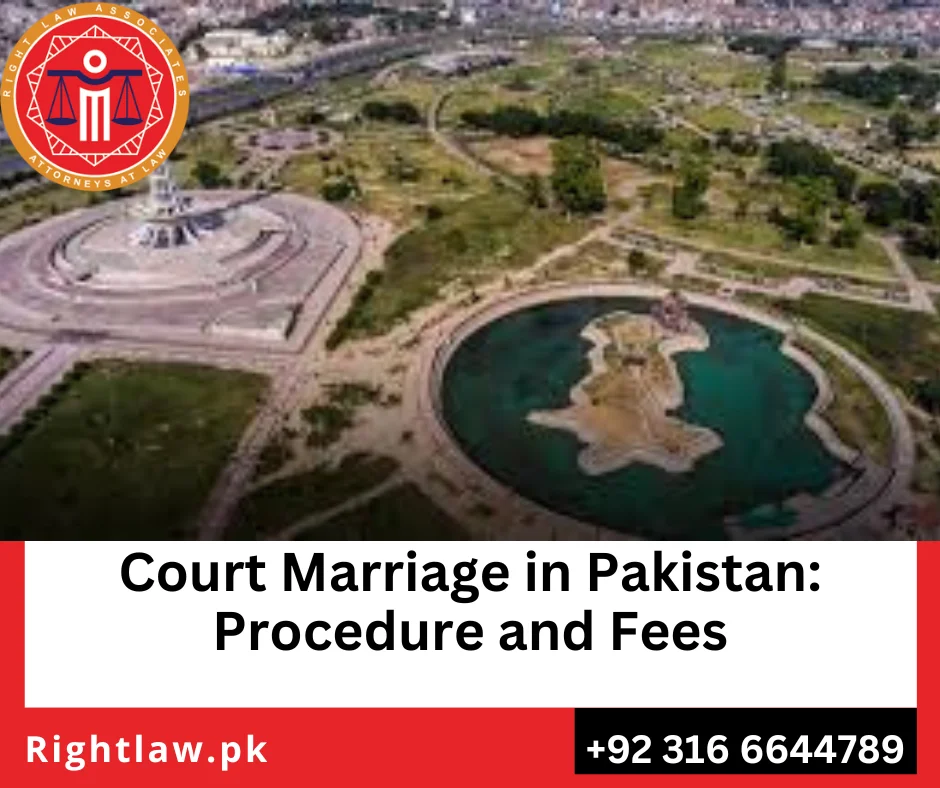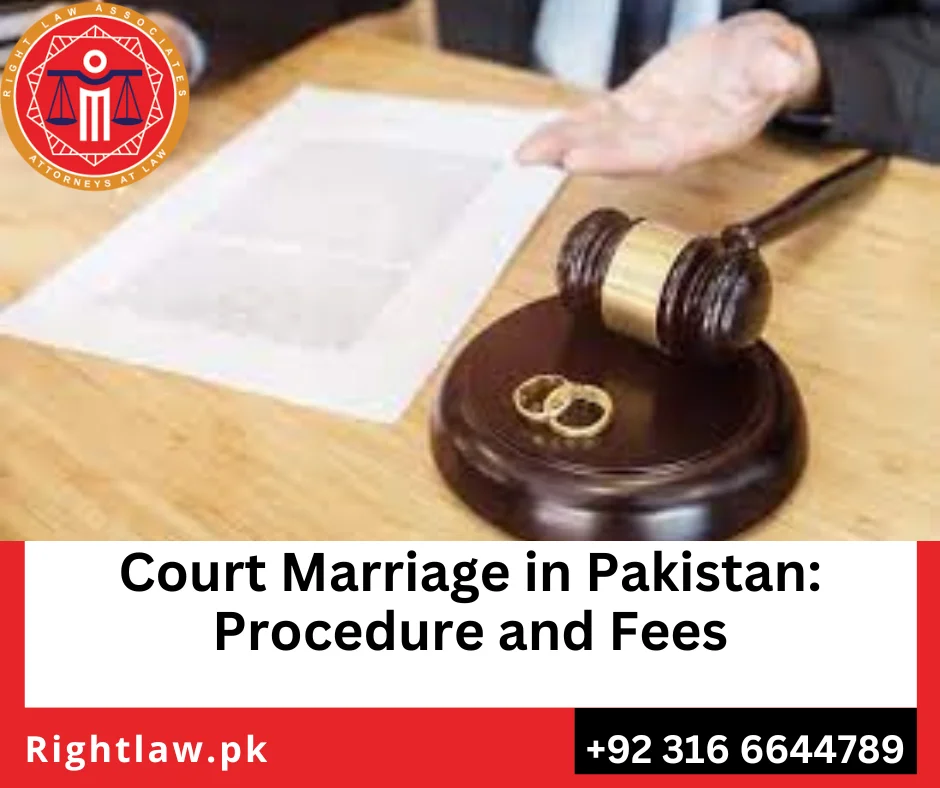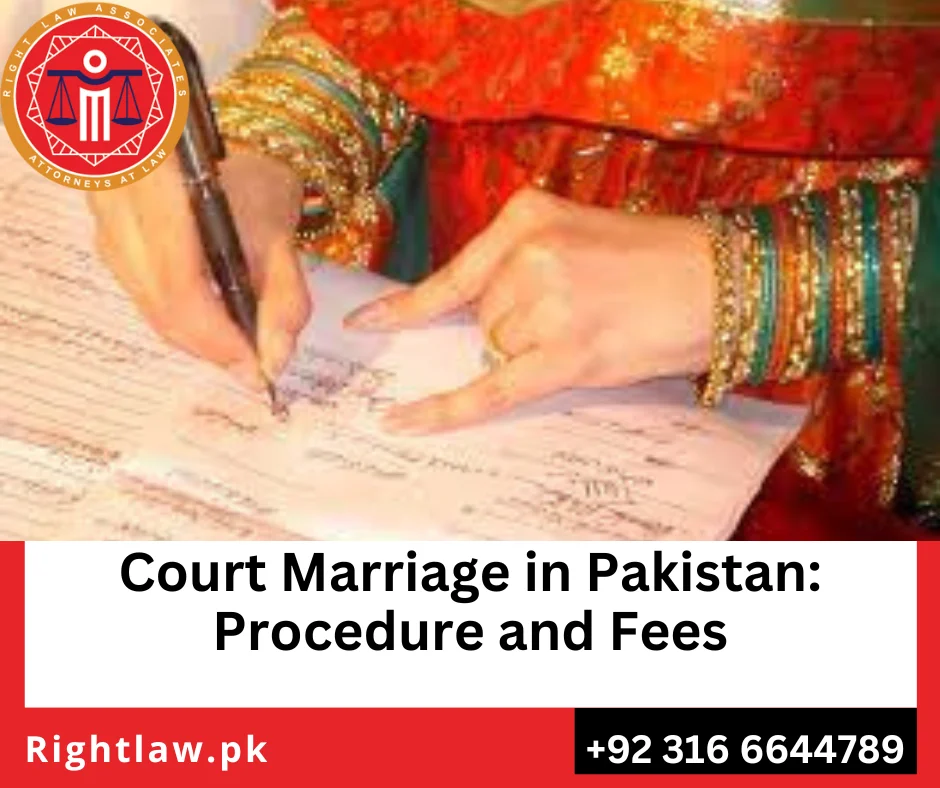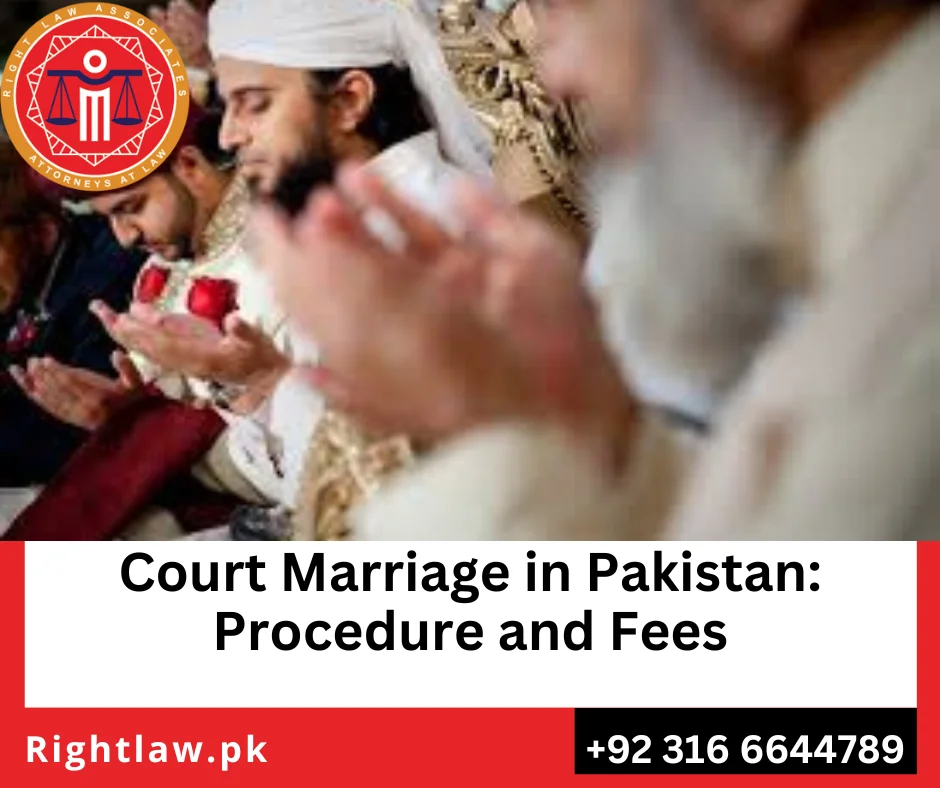- Karachi
- Lahore
- Islamabad
- Leads, UK
- Reading, UK
- Quebec, Canada
Court Marriage in Pakistan: Procedure and Fees
Mohsin Ali Shah, Chairman Qanoon Group, Pakistan
What is Court Marriage in Pakistan?
Court marriage in Pakistan refers to a legal union between two individuals, which is officially recognized by the state through the appropriate legal procedures. This form of marriage is distinct from traditional religious marriages, as it is processed through the judiciary rather than religious institutions. Court marriages offer an alternative for couples who may wish to bypass elaborate rituals and customs of conventional wedding ceremonies. As such, they serve as an accessible option for those seeking a more straightforward and efficient means of formalizing their relationship.
The significance of court marriage in Pakistan lies in its capacity to provide a legal framework that safeguards the rights and obligations of both partners involved. This is particularly important in a cultural context where marital unions are often subject to familial expectations and traditional norms. By opting for a court marriage, individuals may assert their autonomy in choosing their partners, irrespective of societal pressures that might otherwise dictate their choices.
Furthermore, court marriages are recognized under Pakistani law, granting couples a legal status that helps protect their shared rights. In situations where issues arise related to inheritance, custody of children, or other legal matters, couples who have chosen court marriage benefit from a clear legal standing. Additionally, this type of marriage often upholds the principles of equality and mutual consent, as it requires the voluntary agreement of both partners. The procedure of court marriage in Pakistan entails specific requirements that couples must fulfill, allowing interested parties the opportunity to engage in this streamlined and effective means of uniting in matrimony.

Legal Requirements for Court Marriage in Pakistan
In Pakistan, the legal framework governing court marriage requires prospective couples to satisfy several essential conditions for the union to be deemed valid. One of the primary requirements is that both parties must meet the minimum age threshold, which is set at 18 years for males and 16 years for females, as per the Muslim Family Laws Ordinance of 1961. This age restriction is crucial in ensuring that both individuals possess the necessary maturity for marriage.
Another key aspect of the procedure of court marriage in Pakistan is the mental capacity of both individuals. They must possess the mental competence to understand the implications of marriage; this means that both parties should not be suffering from any mental disabilities that would impair their ability to make informed decisions. Couples are also required to demonstrate their freedom to marry, which includes the absence of any existing marital obligations that could render the marriage invalid. Any prior marriages must be legally dissolved before initiating a court marriage.
Consent is a cornerstone of legal marriage in Pakistan. Both individuals must provide unequivocal consent, free from coercion or deception. This requirement not only underlines the importance of mutual agreement but also reflects the principles of autonomy and self-determination. Furthermore, for non-Muslim couples, compliance with the specific laws relevant to their religious communities is mandatory.
It is also important for applicants to possess valid identification documents such as CNICs or passports, along with a few passport-sized photographs. For foreign nationals, relevant visas and no-objection certificates, if applicable, are mandatory. The requirements of court marriage may vary slightly depending on the couple’s circumstances, including caste, religion, or nationality, hence understanding local regulations and provisions is essential for a smooth marriage process.
Step-by-Step Court Marriage Procedure in Pakistan
Court marriage in Pakistan offers couples a legal and straightforward way to formalize their relationship. The procedure involves several essential steps that must be followed in order to ensure a valid marriage contract. To begin with, both parties need to submit an application to the relevant court or family magistrate in their locality. This application should include personal details such as name, age, and identification documents, as these are crucial requirements of court marriage.
After the initial application, the next stage involves the issuance of a notice by the court. This notice serves as an announcement of the intended marriage and allows for any objections from the public to be raised within a stipulated timeframe. It is essential that couples are aware of this as it can affect the timeline of the marriage proceedings. If no objections are submitted during this period, the court proceeds to schedule a hearing date. During this hearing, both parties must appear before the magistrate.
Once the hearing takes place, the court will evaluate the documentation presented. If everything is in order and both individuals fulfill the requirements of court marriage, the magistrate will approve their union. Following this approval, the last step is the issuance of the marriage certificate. This certificate is a legal acknowledgment of the marriage and is often necessary for various purposes, such as obtaining a joint bank account or applying for a visa.
In conclusion, understanding the step-by-step court marriage procedure in Pakistan is vital for couples looking to navigate this process smoothly. By being fully aware of each stage, including application, notice, hearing, and certificate issuance, couples can approach their marriage with confidence and clarity.
Essential Documents for Court Marriage in Pakistan
When embarking on the journey of court marriage in Pakistan, it is imperative to gather the necessary documentation to ensure a smooth and legal process. The requirements of court marriage include several key documents that validate the identities and intentions of the parties involved.
Firstly, both individuals must provide valid Identity Cards (CNIC) issued by the National Database and Registration Authority (NADRA). These identity proofs serve as essential verification of the couple’s identities and ensure that they meet the legal age requirements stipulated by law. Additionally, if either party is a foreign national, they must present their passport and a valid visa, along with a copy of their residence permit in Pakistan.
Another critical document is the passport-sized photographs of both parties. Generally, a set of four photographs for each individual is recommended. This is not only a requirement for official records but also aids in preventing fraudulent activities during the court marriage process.
Furthermore, an affidavit affirming the free will of both parties to marry is necessary. This affidavit typically states that both individuals consent to the marriage without any coercion or undue pressure. It is crucial for safeguarding the ground of mutual consent in any legal proceedings that may arise later.
In certain cases, individuals may also need to produce divorce decrees or death certificates if they were previously married. This documentation ensures that all parties can legally enter into a new marriage without prior obligations affecting the current union.
Preparing these essential documents ahead of time will facilitate the procedure of court marriage in Pakistan, helping couples focus on their commitment to one another rather than on administrative hurdles. By adhering to these requirements, couples can confidently proceed with their court marriage, marking the beginning of their new life together.

The Role of Affidavits in Court Marriage
Affidavits play a critical role in the process of court marriage in Pakistan. These legal documents serve as sworn statements made by individuals involved in a marriage, affirming their consent and intentions. This is crucial, especially in a context where traditional marriages may come with numerous cultural and formal expectations. The procedure of court marriage in Pakistan simplifies many aspects, but affidavits ensure that all legal stipulations are met adequately.
When engaging in the court marriage process, the requirements of court marriage include submitting affidavits that validate both parties’ freedom and willingness to enter into marriage. A typical affidavit will state the names, ages, and national identities of the individuals getting married, as well as a clear declaration affirming that both parties are marrying out of their own free will. This is particularly significant in safeguarding against any undue pressure or coercion, which legally protects the rights of both individuals.
Furthermore, affidavits may also include details pertaining to prior marital status, confirming whether either party has been previously married and, if so, whether that marriage has been legally dissolved. This ensures transparency and legality in the court marriage process, safeguarding against future disputes. The signed affidavit is subsequently presented before the registrar during the legal proceedings of court marriage.
The legal framework surrounding court marriage in Pakistan necessitates the affirmation of consent through affidavits, thus highlighting their importance. Without such documentation, the validity of the marriage could be challenged, leading to legal complications. Ultimately, affidavits serve as an essential component that reinforces the contractual nature of marriage and contributes significantly to the legitimacy of marriages performed within the court system.
Witnesses Required for Court Marriage in Pakistan
In the context of court marriage in Pakistan, the role of witnesses is an essential aspect of the legal procedure. To ensure that the marriage is conducted in a legally sound manner, the presence of witnesses is mandated. Specifically, the procedure of court marriage in Pakistan requires the involvement of two witnesses who must be present during the marriage ceremony to substantiate the union. These witnesses play a crucial role in verifying the identities of the individuals getting married and affirming that the consent given is genuine and voluntary.
Eligibility criteria for witnesses in a court marriage are straightforward. Typically, witnesses must be of legal age, which means they should be at least 18 years old. Furthermore, witnesses must have the capacity to understand the significance of the marriage contract. This requirement ensures that individuals representing the couple are both competent and reliable, thus preventing potential disputes regarding the legitimacy of the marriage. Although there are no specific restrictions on the gender of the witnesses, it is advisable to choose individuals whose presence will contribute positively to the ceremony.
The significance of witnesses in court marriage cannot be overstated. Their involvement helps to ensure that the marriage is not only conducted within the boundaries of the law but also stems from the intentions of the marrying couple. Witnesses can provide vital testimony regarding the circumstances surrounding the marriage, should any legal complications arise in future. This aspect emphasizes the ethical dimension of court marriages in Pakistan, reinforcing the commitment of the individuals involved. Ultimately, the requirements of court marriage, including the witness role, work collectively to uphold the integrity of such unions in the legal framework of Pakistan.
Importance of the Nikahnama in Court Marriage
The Nikahnama, or marriage certificate, plays a vital role in the procedure of court marriage in Pakistan. It is not merely a ceremonial document; it serves as a formal record of the union between two individuals. The Nikahnama outlines essential information about both parties, including their names, ages, CNIC numbers, and their respective addresses. This document becomes the legal proof of marriage, which is particularly significant since court marriages may differ from religious marriages. Therefore, understanding its importance is crucial for individuals considering this option.
One of the primary purposes of the Nikahnama is to establish the legal status of the marriage in the eyes of the law. In the context of court marriage in Pakistan, the Nikahnama must be duly signed by both parties and witnessed by two witnesses as per Islamic requirements. This ensures that the marriage is not only recognized by the civil authorities but also abides by Islamic principles. As such, the couple acquires matrimonial rights and responsibilities once the Nikahnama is appropriately filled out and registered.
Furthermore, the Nikahnama often includes stipulations agreed upon by both parties, such as the wife’s right to her dowry and financial support from her husband, thus granting her essential legal rights. The presence of this official document ensures both protection and clarity in the marital relationship, making it indispensable during legal proceedings, particularly in cases of divorce or separation. In conclusion, the Nikahnama serves not only as a record of the marriage but also as a crucial tool for safeguarding the rights and obligations of both partners. As such, understanding the requirements of court marriage and ensuring the proper handling of the Nikahnama should be a priority for couples entering this legal union in Pakistan.
Age Requirements for Court Marriage in Pakistan
The age requirements for court marriage in Pakistan are governed by legal stipulations intended to protect minors and ensure that individuals are sufficiently mature to make informed decisions about marriage. According to the Pakistani legal framework, the minimum age for marriage is 18 years for both men and women. This regulation is rooted in the Muslim Family Laws Ordinance of 1961, which mandates that individuals must attain this age before engaging in the procedure of court marriage in Pakistan.
It is essential to note that marriages involving individuals below the stipulated minimum age are considered invalid unless specific circumstances apply. For females, the age requirement is often set with additional considerations, as societal norms and interpretations can influence perspectives on acceptable age. If individuals engage in a court marriage in Pakistan before reaching the legal age, this could lead to legal ramifications, including annulment of the marriage or penalties for the parties involved.
Consent plays a crucial role in the marriage process, especially for underage individuals. If a person is under the age limit and seeks to marry, they will typically require parental consent to move forward. However, even with parental approval, the court may still be reluctant to acknowledge such marriages due to the legal safeguards aimed at protecting minors. Additionally, the importance of thorough documentation cannot be overstated, as it may be required to demonstrate age through official records such as birth certificates or national identification cards.
In conclusion, understanding the age requirements for court marriage in Pakistan is crucial for individuals considering this option. Legal implications of marrying under the specified age highlight the importance of adhering to established laws, ensuring that marriages are permitted, and legitimate within the eyes of the law.

Court Marriage Procedure for Non-Resident Pakistanis
Court marriage in Pakistan, particularly for non-resident Pakistanis, requires adherence to specific procedures that may differ from those applicable to residents. The process begins with understanding the legal representation needed to facilitate this type of marriage while being located outside Pakistan. Non-resident Pakistanis must appoint a legal representative who will act on their behalf during the marital proceedings. This individual is often entrusted with ensuring that the procedural requirements of court marriage are fulfilled properly.
The first step for non-residents is to gather the necessary documentation. Essential documents typically include valid passports, national identity cards, and any prior divorce decrees or death certificates if applicable. It is crucial that these documents are translated into Urdu, attested, and verified by the relevant authorities to avoid complications. Additionally, a Nikkah Nama (marriage registration form) must be prepared, which includes the signatures of both parties and witnesses, ensuring compliance with Islamic law if one or both parties are Muslim.
Non-resident Pakistani citizens should also be aware of the importance of obtaining legal opinions or advice prior to initiating the marriage procedure. This can aid in addressing any legal hurdles that may arise due to their status. The procedure of court marriage in Pakistan can vary in timeline and processing based on the individual’s situation, and hence planning and preparation are vital. Once all documentation is in order, the representative can file the application for the marriage before the relevant court. The court will review the documents and possibly require a personal appearance of the parties involved via video conferencing or other means if necessary.
Overall, the requirements of court marriage for non-resident Pakistanis encompass various critical steps, necessitating careful attention to detail to ensure a successful and legally compliant marriage. It is advisable for individuals in this scenario to stay informed about any changes in legal frameworks or requirements that may affect their marriage proceedings.
How to Initiate the Court Marriage Process in Pakistan
Initiating the court marriage process in Pakistan requires careful attention to specific steps and requirements. First, couples must understand the importance of selecting the appropriate court where they will file their application. Generally, this is the local family court, which has jurisdiction over the area where the marriage is to take place. It is recommended to check the specific rules and regulations as this can vary by region.
Once the court is identified, couples should prepare to complete the necessary forms for the procedure of court marriage in Pakistan. These forms typically include an application for marriage registration and an affidavit confirming the freedom to marry. Both parties must provide valid identification documents, such as national identity cards, and in some cases, birth certificates may also be required. Ensuring that all forms are accurately filled out and submitted will facilitate a smoother process.
Before officially applying, couples are advised to attend pre-marriage consultations, which can be beneficial in understanding the legal framework governing court marriage in Pakistan. Consultation sessions can prepare couples for what to expect during the marriage registration and can highlight any potential legal issues that may arise. Moreover, this might be an opportune time to gather information regarding wedding witnesses and other essential requirements of court marriage.
After all necessary documentation is in order, couples will need to submit their application to the court along with the prescribed fee. It is advisable to keep copies of all submitted documents for personal records. Following this submission, the court will schedule a date for the marriage solemnization where the couple can officially tie the knot, thus completing the procedure of court marriage in Pakistan efficiently.
Court Marriage Fees in Different Cities of Pakistan
The fees associated with court marriages can vary considerably across different cities in Pakistan. Couples planning to engage in a court marriage in Pakistan should be aware that these fees include not only the administrative costs but also potential legal charges, which can fluctuate based on local regulations and practices. Understanding the procedure of court marriage in Pakistan requires an examination of these fees as they are an essential aspect of the overall marriage process.
In major metropolitan areas such as Karachi, Lahore, and Islamabad, the court marriage fees can be higher due to increased demand and the availability of legal services. For example, the total cost in Karachi may range from PKR 20,000 to PKR 50,000, considering registration, documentation, and additional charges for notary services. Conversely, smaller cities might see lower costs, often between PKR 10,000 to PKR 25,000. This variation is indicative of differing service availability and competition among service providers.
Additionally, it’s important to note that the requirements of court marriage can impact the total fees incurred. Some cities may require additional documentation or specific legal formalities, thereby leading to extra expenses. Couples should also be mindful of potential costs associated with obtaining necessary identification documents, which can further influence the overall financial commitment of the court marriage process.
As couples consider a court marriage in Pakistan, it is advisable to conduct thorough research on the fees applicable in their specific city. This understanding not only aids in budgeting but also prepares couples for any unforeseen costs associated with the procedure of court marriage in Pakistan. Furthermore, consulting with legal professionals or local marriage registrars can provide accurate and up-to-date information on current fees and requirements, ensuring a smooth and cost-effective marriage process.

Court Marriage in Pakistan: A Hassle-Free Option
Court marriage in Pakistan has emerged as a pragmatic choice for many couples seeking a simple and efficient alternative to traditional wedding ceremonies. One significant advantage of this procedure is the streamlining of legal requirements, making it a more accessible option for couples who may face challenges with elaborate wedding arrangements.
Unlike conventional marriages, which often involve extensive planning, cultural ceremonies, and family gatherings, the process of court marriage can be completed swiftly and with minimal bureaucratic hurdles. To initiate the procedure of court marriage in Pakistan, couples need only to fulfill certain legal requirements, which are generally straightforward. This efficiency allows couples to focus on their commitment rather than the logistics of a grand celebration.
Moreover, opting for a court marriage ensures that the relationship is recognized legally from the outset. This legal acknowledgment provides couples with various rights and protections under the law, such as inheritance rights and marital benefits. In addition, court marriage offers a level of privacy that traditional ceremonies may not provide. Couples can often avoid the pressures of societal expectations and familial obligations, allowing them to celebrate their union in a more personal, intimate setting.
Court marriages also tend to be more cost-effective. Traditional weddings often involve considerable expenses related to venues, catering, and decorations, which can be burdensome for many families. In contrast, the costs associated with the procedure of court marriage in Pakistan are typically modest, encompassing only the necessary legal fees and documentation.
In conclusion, court marriage stands out as a straightforward and efficient option for couples in Pakistan. By prioritizing legality, simplicity, and affordability, it serves as an appealing choice for those looking to formalize their commitment without the complexities often associated with traditional wedding ceremonies.
Protecting Rights Through Court Marriage in Pakistan
Court marriage in Pakistan serves not only as a legal union but also as a robust framework for safeguarding the rights of individuals involved. Unlike informal or traditional unions, the legal recognition afforded by court marriage ensures that couples have their rights duly protected under the law. This becomes crucial in matters of inheritance, social security, and marital responsibilities, which are significant aspects of any marriage.
One of the primary advantages of entering into a court marriage in Pakistan is the legal standing it grants couples regarding inheritance rights. In the event of the death of one spouse, the surviving partner is entitled to a share of the deceased’s estate as per Islamic law or the relevant legal provisions. This legal recognition is pivotal, especially in a society where informal marriages may not provide such security, leaving surviving partners vulnerable and unprotected.
In addition to inheritance rights, court marriage in Pakistan also plays a crucial role in ensuring social security and other benefits for couples. Legal marital status creates access to various social privileges that can aid in financial stability. For instance, a spouse may qualify for pension benefits or insurance claims, which can significantly contribute to the well-being of the surviving partner. These provisions underline the necessity of the procedure of court marriage in Pakistan, as they emphasize the importance of having an official certificate that substantiates the marital status.
Moreover, the responsibilities that accompany marriage, including mutual support and care, are legally enforceable through a court marriage. This legal framework facilitates the resolution of conflicts and ensures compliance with marital obligations. Thus, couples are afforded a sense of security knowing they have legal recourse in case of disputes.
Ultimately, court marriage is not merely a formality, but a crucial step towards ensuring that individuals’ rights are fully protected in a legal context, fostering a secure environment for both spouses.
Court Marriage in Pakistan: Understanding Consent and Free Will
In the context of court marriage in Pakistan, the concepts of consent and free will are of paramount importance. These two elements serve as the foundation upon which a legal marriage is established. It is essential that both parties involved enter into the marriage voluntarily, without any external pressures or coercion. This ensures that the union is built on mutual agreement and understanding, which is crucial for the stability of the marriage.
The procedure of court marriage in Pakistan mandates the clear expression of will by both individuals. This is particularly significant given the cultural and societal pressures that may influence personal decisions. Legal frameworks are designed to protect the rights of both parties, emphasizing that marriage should not be entered into lightly or under duress. In fact, authorities often require a declaration or affidavit from both parties confirming their consent. This step is critical to affirming that they are not only agreeing to the marriage but are also fully aware of the implications that accompany such a commitment.
Furthermore, should any issues regarding consent arise, it can lead to legal repercussions. A marriage founded on inadequate consent could be challenged or annulled in a court of law, highlighting the importance of genuine agreement in these proceedings. Legal professionals engaged in court marriage in Pakistan stress that ensuring clear communication between both parties is essential for maintaining the integrity of the legal process. Tracking requirements of court marriage further assists in safeguarding the principles of free will.
Thus, the significance of consent and free will cannot be understated in the procedure of court marriage in Pakistan. These principles not only protect individuals but also reinforce the legitimacy of the marriage itself. It is vital that both parties engage in open discussions to ascertain each other’s intentions before taking this significant step.

Court Marriage Procedure for Couples from Different Faiths
Court marriage in Pakistan allows couples from diverse religious backgrounds to legally unify, although specific procedures must be followed to ensure compliance with the law. The process of court marriage for interfaith partners primarily revolves around obtaining the necessary certifications and fulfilling legal requirements set forth by Pakistani law. This is especially crucial since, in some cases, the procedures of court marriage in Pakistan may differ slightly based on the religious identity of the individuals involved.
Initially, both parties must provide valid identification documents, such as national identity cards or passports. It is also essential for the couple to furnish proof of their marital status, indicating that they are not currently married to anyone else. Additionally, religious conversions may be a consideration in some cases; however, they are not mandatory for interfaith marriages under Pakistani law, and couples are encouraged to consult with legal experts to determine their options.
Once the couple has gathered the necessary documents, they must visit the Family Court, where a marriage registrar oversees the ceremony. It is advisable for the couple to be accompanied by witnesses to validate the union. After the registration process is completed, the marriage is recorded in the official registry, thereby granting it legal recognition in Pakistan.
It is essential for couples from different faiths to remain aware of societal norms and to approach their families with transparency about their intentions. While Pakistani law allows for interfaith marriages, such unions may still encounter social hurdles. Understanding the procedure of court marriage in Pakistan aids couples in navigating these challenges more effectively while ensuring their rights are upheld legally.
In conclusion, understanding the court marriage procedure in Pakistan for couples from different faiths promotes legal and social acceptance of diverse partnerships. This helps ensure that individuals are adequately prepared for the implications of their marriage and can approach the process with confidence.
Court Marriage Laws for Foreign Nationals in Pakistan
Court marriage in Pakistan is governed by specific legal guidelines that differ slightly for foreign nationals compared to Pakistani citizens. Understanding the procedure of court marriage in Pakistan is essential for foreign citizens wishing to marry in the country. The legal framework provides certain accommodations, ensuring that foreign nationals can successfully navigate this process with relative ease, though they may face additional requirements.
One of the primary requirements of court marriage for foreign nationals is the provision of valid identification documents. This generally includes a passport and, where applicable, a visa demonstrating their legal residency in Pakistan. Furthermore, if either party has previously been married, they must present official documentation confirming the dissolution of prior marriages, such as divorce decrees or death certificates of former spouses. Adhering to these guidelines is vital, as they demonstrate compliance with legal stipulations under Pakistani law.
In terms of procedure, foreign nationals wishing to enter into a court marriage should approach the relevant court or marriage registrar. Both partners are required to be present, along with two witnesses, to fulfill the legal requirements. The court may necessitate the signing of a marriage contract, which outlines rights and responsibilities, as well as any prenuptial arrangements made by either party. Following the completion of necessary formalities, the court will issue a marriage certificate, which is a crucial document for both legal and administrative purposes.
It is also important for foreign nationals to understand how their marriages may be treated under Pakistani law. Marriages conducted in Pakistan are recognized as legal, and procedures are in place to ensure that foreign spouses receive appropriate rights and protections. In conclusion, while foreign nationals may have to meet additional requirements for court marriage in Pakistan, understanding the legal framework can help ensure a smooth process for all parties involved.
Common Misconceptions About Court Marriage in Pakistan
Court marriage in Pakistan is often shrouded in a variety of misconceptions that can lead to confusion and apprehension among couples considering this legal option. One prevalent myth is the belief that court marriage is only suitable for interfaith or intercaste couples. While it is certainly a valid choice for couples from different backgrounds who may face societal barriers, court marriage is equally accessible for couples belonging to the same religious or cultural background. The procedure of court marriage in Pakistan provides a legal avenue for couples to formalize their union, irrespective of their communal affiliations.
Another common misconception is that court marriage lacks the same legitimacy as traditional marriages performed according to cultural or religious customs. In reality, court marriage in Pakistan is recognized by law, and the marriage certificate issued by the court holds the same legal standing as a marriage conducted in a religious venue. This recognition ensures that couples are afforded the same rights and protections under the law, including inheritance rights and the ability to make medical decisions for one another. Couples should understand that the requirements of court marriage primarily focus on the legal aspects necessary for a binding union, rather than on traditional customs.
Furthermore, there is an unfounded notion that court marriage is a lengthy and complex process. On the contrary, the procedure of court marriage in Pakistan is designed to be efficient and straightforward, typically requiring only a few documents and a nominal fee. Prospective couples should be aware that with proper guidance, they can navigate the requirements of court marriage without undue stress. This understanding can empower couples to make informed decisions about their marital journey, dispelling the myths that surround this important institution.

Benefits of Choosing Court Marriage in Pakistan
Court marriage in Pakistan presents an array of advantages that can significantly facilitate the union of couples seeking legal affirmation of their relationship. One of the most prominent benefits is the assurance of legal security. By opting for a court marriage, couples receive a marriage certificate recognized by the law, providing them legal rights and protections that might otherwise be complicated to obtain. This legal status can be crucial in safeguarding the interests of both partners in future considerations such as inheritance, property rights, and even custody matters.
Another compelling reason couples may choose the procedure of court marriage in Pakistan is the emphasis on privacy. Traditional wedding ceremonies often attract numerous relatives and guests, leading to a loss of intimacy. In contrast, court marriage allows couples to celebrate their union without public scrutiny, enabling them to focus solely on their commitment to each other. This understated approach can often reduce unnecessary stress and give the couple control over their unique experience.
Additionally, the requirements of court marriage are relatively straightforward compared to the elaborate rituals and financial burdens associated with traditional weddings. Couples opting for court marriage can avoid the pressure of extensive wedding planning and expenditures, allowing them to allocate resources towards their future together instead. This pragmatic approach is particularly appealing to those who prefer a simple, efficient method of formalizing their relationship without succumbing to societal expectations.
Furthermore, court marriage can facilitate quicker legal proceedings, enabling couples to expedite the process of becoming legally united. In a fast-paced world where time is often of the essence, this efficiency can be a deciding factor for many. Overall, these benefits highlight compelling reasons for couples to consider court marriage in Pakistan as a viable option for asserting their commitment.
The Role of Lawyers in the Court Marriage Procedure
The court marriage in Pakistan is a significant step for couples seeking legal recognition without the traditional religious ceremonies. Navigating through the procedure of court marriage in Pakistan can often be complex due to the legal requirements involved. This is where the role of lawyers becomes critical. Legal representation not only ensures that couples understand their rights but also streamlines the overall process.
One of the primary functions of a lawyer during the court marriage procedure is to inform the couple about the necessary requirements of court marriage. This includes guiding them through the documentation needed, which typically consists of identification cards, affidavits, and, in some cases, proof of termination of any previous marriages. Lawyers help in making sure that all these documents comply with the legal standards set forth by the authorities. Moreover, they prepare and file the marriage application on behalf of the couple, ensuring the proper legal framework is maintained.
Additionally, lawyers are instrumental in safeguarding the interests of both parties during the marriage process. They assist in understanding the implications of marriage under Pakistani law, including aspects related to inheritance, divorce, and property rights. By offering legal counsel, they ensure that couples make informed decisions, thus reducing potential difficulties in the future. Their expertise helps couples navigate potential legal hurdles, ensuring that all proceedings are conducted smoothly and efficiently.
In summary, the role of lawyers in the court marriage process is indispensable. They not only facilitate the procedure of court marriage in Pakistan but also provide essential support and guidance, ensuring that couples meet all legal requirements necessary for a successful marriage. This professional assistance fosters confidence and security, making the journey of court marriage a more informed and structured experience for couples seeking to formalize their commitment legally.

Why Court Marriage is a Transparent Process in Pakistan
Court marriage in Pakistan has gained recognition as a transparent and lawful option for couples seeking to formalize their union. Unlike traditional marriages, which often involve numerous social customs and rituals that can obscure the actual agreement between spouses, court marriages are legally binding and clearly defined by law. This method emphasizes a straightforward approach, where the legal framework is well-established, ensuring that both parties understand their rights and responsibilities from the outset.
The procedure of court marriage in Pakistan is laid out comprehensively in the relevant legal statutes, which necessitate specific documentation, making the process inherently transparent. Couples are required to provide clear proof of identity, which typically includes national identification cards, along with verification of their marital status. This requirement significantly reduces the chances of fraudulent representations or misunderstandings regarding the marital status of either party.
Moreover, the requirements of court marriage are designed to ensure mutual consent, which is a fundamental aspect of any lawful union. This mutual agreement must be documented and presented before a magistrate or a family court judge, who assesses the authenticity of the application and confirms the voluntary nature of the union. The presence of a government official also adds an element of credibility and verification, which is often lacking in informal arrangements.
In addition to these measures, court marriages typically involve a waiting period, allowing for any objections or challenges to be raised, further safeguarding the process’s integrity. This transparency not only protects the rights of both individuals but also reinforces the societal recognition of their marital status under the law. Consequently, court marriage in Pakistan stands as a reliable alternative to traditional marriage, ensuring that all parties are fully informed and agree to the terms of their union.
Legal Services
- Divorce Law
- Child Custody
- Family Law
- Financial Law
- Civil Legalation
Syed mohsin Ali Shah
Phone : +92316-6644789
Let's Connect
- 0333 1127835
- [email protected]
- M-51, M-52, Muneer Mobile Mall, Near Perfume Chowk Jauhar Chowrangi, Block 17, Gulistan-e-Jauhar, Karachi, Pakistan.
- Suite No. 5, 2nd Floor, Laraib Centre, Mangla Road, Karachi Company, G-9 Markaz, Islamabad Pakistan
-
NADRA Divorce Certificate Services in Pakistan
-
NADRA Birth Certificate Services in Pakistan
-
Court Marriage with Full Privacy Assurance
-
Court Marriage for Couples Seeking Legal Union
-
Court Marriage in Pakistan: Court Marriage Process & Fees
-
Court Marriage: Confidential & Hassle-Free Solutions
-
Trend of Court Marriage in Pakistan: Court Marriage's Reasons
-
Court Marriage Services in Karachi, Lahore, Islamabad, and Rawalpindi
-
Understanding Court Marriage in Pakistan: A Guide to Court Marriage
-
Best Family: What Makes a Family Truly Great
-
Divorce Papers in Pakistan: Divorce Deed and NADRA Divorce Certificate
-
Court Marriage in Pakistan: Procedure and Fees
-
Court Marriage in Lahore: Our Court Marriage Service in Lahore
-
Nikah Khawan and Nikah Registrar Services in Karachi, Pakistan
-
Family Law in Pakistan-The Muslim Family Law Ordinance 1961
-
Understanding Online Nikah: The Crucial Roles of Nikah Khawan and Nikah Registrar
-
Nikah Khawan and Nikah Registrar Services in Pakistan
-
Lawyers Help for Court Marriage Procedure in Karachi
-
Online Marriage in Islam: Muslim Online Marriage
-
Court Marriage in Pakistan—Legal Procedure, Social Realities, and Support for Couples
-
Court Marriage, Online Marriage, and Nikah-Khawan Services in Islamabad & Rawalpindi
-
Online Marriage/Nikah | Online Marriage/Nikah Services In and From Pakistan
-
Nikah Khawan/Qazi Services and Fees in Karachi-Lahore-Islamabad/Rawalpindi-Faisalabad-Multan
-
Court Marriage Pakistan | Court Marriage Services-Process-Fees in Pakistan
-
Embracing Online Marriage Services Across Karachi, Lahore, Islamabad, and Rawalpindi, Pakistan
-
Family Law | Expert Divorce Lawyers For Khula/Talaq (Divorce) in Karachi, Islamabad/Rawalpindi & Lahore, Pakistan
-
Guardianship Lawyers in Karachi, Lahore, & Islamabad Pakistan
-
Child Custody Lawyers in Karachi, Lahore, & Islamabad-Pakistan
-
English Nikah Nama | English Nikah Nama Available in Karachi
-
Family Law | Expert Divorce Lawyers For Khula/Talaq (Divorce) in Karachi, Islamabad/Rawalpindi & Lahore, Pakistan
-
Nikah Nama Urdu/English Available in Karachi
-
Nadra Marriage Registration Service | Marriage Registration Certificate
-
Marriage Registration | Nadra Marriage Certificate-Karachi
-
Nikah Nama Services with Nikah Nama English & Urdu
-
Nikah Registration | Nikah Registration Services-Pakistan
-
What is Child Guardianship
-
Top Rated Advocates for Family Law Matters
-
B Form NADRA: Importance of B Form in Pakistan
-
Nadra B Form in Pakistan
-
Is Court Marriage Legal in Pakistan
-
Child Maintenance Advocates in Karachi
-
Consumer Rights Advocates in Karachi
-
Best Leady Lawyer Expertise as a Family Court Lawyer
-
Online Nikah Marriage In Pakistan
-
Business Corporate lawyers in Pakistan
-
Criminal Lawyers in Karachi | Lahore | Islamabad Rawalpindi | Pakistan
-
Understanding Business Law Corporate Lawyers Services in Pakistan
-
Online Marriage Technology in Modern
-
Court Marriage Professional Lawyers in Lahore
-
Court Marriage in Pakistan and Civil Marriage: Right Law Firm
-
Property Lawyers in Pakistan
-
Property Lawyers Expert in Pakistan
-
Minimum Wage in Pakistan
-
Property Disputes a Comprehensive Guide
-
Child Adoption Procedure & Services in Pakistan
-
Legally Valid Online Nikah, Your Love Story with Online Marriage
-
Online Nikah Excellence Pioneering Legally Sound Online Marriage
-
Court Marriage the Effortless Formality
-
Court Marriage in Pakistan-No.1 Court Marriage Service in Karachi
-
Navigating the Path to Legal Unions, Court Marriage in Pakistan
-
Court Marriage, Empowering Personal Choice and Freedom
-
Trusted Court Marriage Law Firm
-
Court Marriage a Journey Court Marriage in Pakistan
-
Power of Nikah Certificates
-
Nikah Certificates-Legality in Pakistan
-
Adoptions and Adoptive Families in Pakistan
-
Court Marriage in Pakistan A Comprehensive Guide
-
<strong>Tax Lawyer Mohsin Ali Shah</strong>
-
Civil Lawyers The Importance of Evidence in Civil Cases-Expert Tips for Civil Lawyers
-
Can There Be Objections to a Public Party Following a Court Marriage.
-
Court Marriage Making Love Officially Recognized Via Court Marriage
-
Court Marriage, Civil Marriage & Online Nikah in Pakistan
-
Misyar Marriage Nikah Misyar Facts About Misyar Marriages
-
Online Nikah and Online Marriage in Pakistan
-
The government of Pakistan amended the Civil and Criminal Law to bring reforms in Justice System
-
Child Adoption & Guardianship in Pakistan
-
Restitution of Conjugal Rights
-
Difference between Divorce Talaq and Khula:
